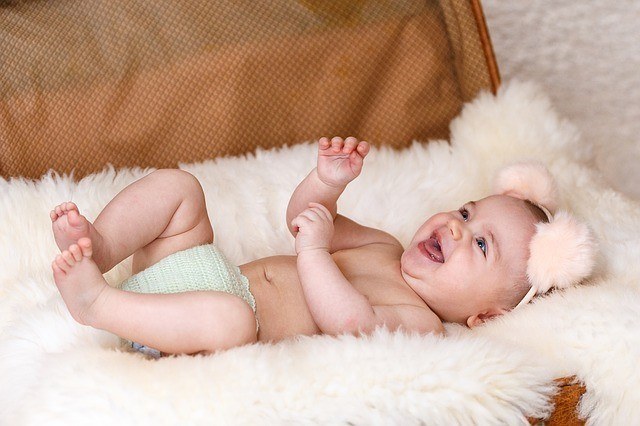When do babies become ticklish? This is a question that new parents mostly have in mind when they get to bond with their babies. Moreover, all parents like seeing their baby laugh or smile. To do this, you might have attempted to tickle your baby a few times. However, your baby might not have responded the way that you expected him or her to respond. Let’s find out about it in this article.
How do Babies Perceive Tickles?
When babies are born, they aren’t immediately able to perceive tickles. Moreover, babies are still learning about their bodies and are just beginning to associate it with various sensations. Initially, babies will not be able to link touch sensations from the person trying to tickle them. Hence, they may not respond as if they were tickled.
However, after several months and the body map has been imprinted in your baby’s mind, he or she may then perceive a tickle sensation and link it to the person touching them.
When do Babies Become Ticklish?
Babies usually become ticklish at about 6 months old. During this time, their touch perception has fully developed and they may feel a ticklish sensation. Moreover, babies that are 6 months old or older may already recognize the person trying to tickle them.
Babies may have already recognized their body parts and may already know when they are touched. However, the tickle sensation may only be felt in certain areas. Besides, babies may feel ticklish in the same area until toddlerhood or older. When babies become ticklish they are also able to recognize people and faces, so they know who is tickling them at that time and may respond differently if a stranger does the same.
Twins and multiples may not begin to be ticklish at the same time. But, this is a developmental milestone that babies may go through at different stages in their lives. For twins and multiples, one may begin to perceive tickle earlier than the other. However, it is still normal and it doesn’t mean that the other is lagging when it comes to their physical development.
Are Tickles Harmful for Your Baby?
Tickles may be harmful to your baby if it is done for a long time and your baby is unable to handle it well. Besides, babies begin to get ticklish even before they may be able to talk, so they may not be able to tell you when to stop. Tickles are generally safe if done moderately as it allows your baby to learn about their bodies, too.
Tickles are generally viewed as safe. However, there are times that babies may encounter problems during tickle times. Babies may have difficulty in burping after feeding if they are being tickled too much. Also, if they are tickled shortly after feeding, babies may regurgitate their meal and may cause discomfort.
If your baby is gassy, then tickling your baby can make things worse. This is because tickling your baby may cause him or her to ingest air while laughing too much. Moreover, babies usually aren’t able to tell you when they can’t handle it anymore and may eventually have difficulty breathing while ingesting air.
Are Tickles Beneficial for Your Baby?
Tickles when done in moderation may be beneficial for your baby. Moreover, this is the way your baby may learn about his or her body map. Also, this stimulates the senses for a tactile response which is essential in your baby’s development.
This is very important especially for the hands and feet as your baby needs to develop strong sensations and coordination for these parts of the body to prepare him or her for more advanced tasks later in life.
Tickling is beneficial for your baby’s brain as it stimulates cognition to connect the sensation with a person. This may feed information to your baby’s brain to help with your baby’s development. The connection of the mind and sensory perception may help your baby well when he or she is beginning to stand or walk. Your baby’s brain is always developing and touch stimulation may help your baby’s brain develop well.
Tickles are generally beneficial for your baby as he or she learns about his or her body. It is one of the ways to help your baby form a body map and develop coordination. Also, tickling triggers your baby to laugh or smile which triggers the release of neurotransmitters in the brain that are attributed to happiness.
How to Safely Tickle Your Baby?
As parents, you probably love to hear your baby’s giggles when he or she begins to feel ticklish. However, even though tickles have some benefits for your baby, it may also have some negative effects if done excessively. The key is identifying the cues when your baby has had enough of the tickles. Here are some ways on how you can safely tickle your baby:
- Tickle with some intervals
- Do not tickle your baby excessively without rest. Your baby might seem happy, but he or she might already have difficulty in breathing and just can’t tell you to stop.
- Do not tickle your baby shortly after feeding
- Make sure your baby has already burped before attempting to tickle him or her
- Talk to your baby while tickling him or her to promote language skills
- Attribute tickles with other playtimes
- Do not tickle your baby when he or she is already feeling gassy
- Do not tickle your baby when he or she is already having difficulty in breathing
When do Babies Laugh?
Around month three or four, most newborns will start laughing. But when do babies become ticklish? Babies usually begin to feel ticklish at around 6 months old. However, tickles may both be harmful or beneficial for your baby, so it is important to understand the cues that your baby is showing when he or she needs to take a break from tickles.










 Store
Store